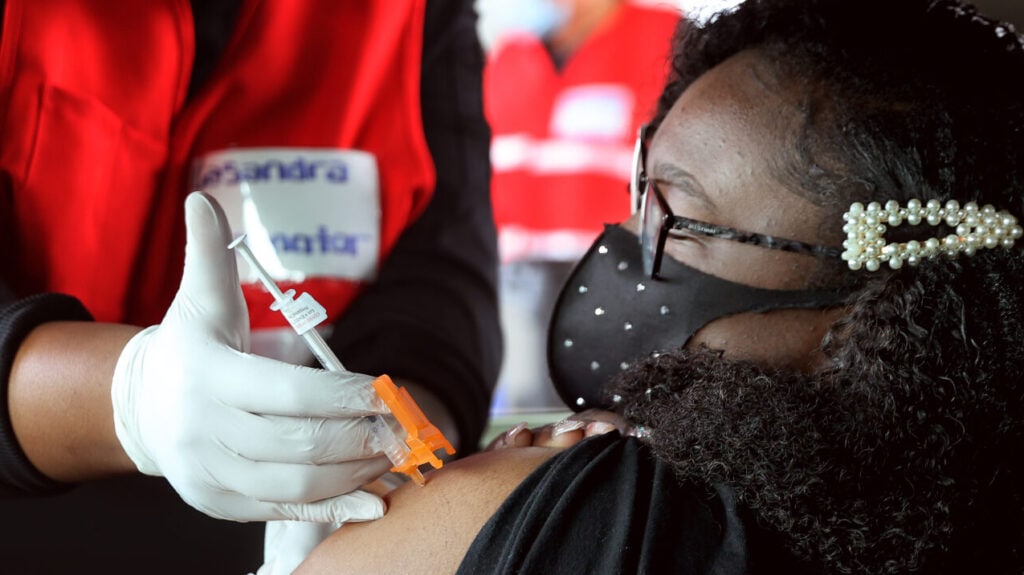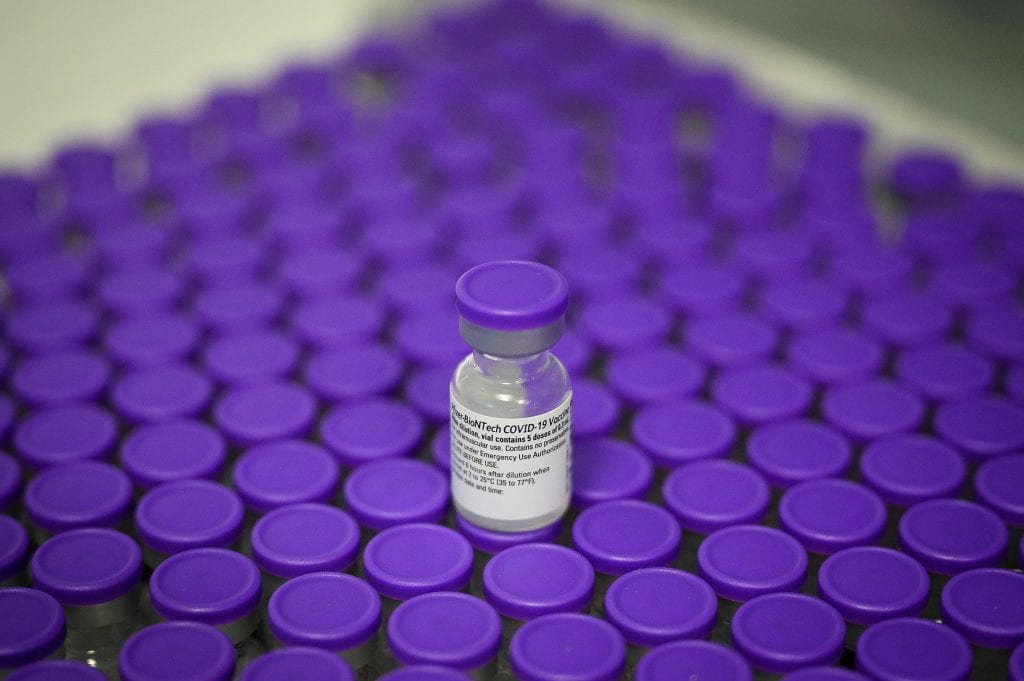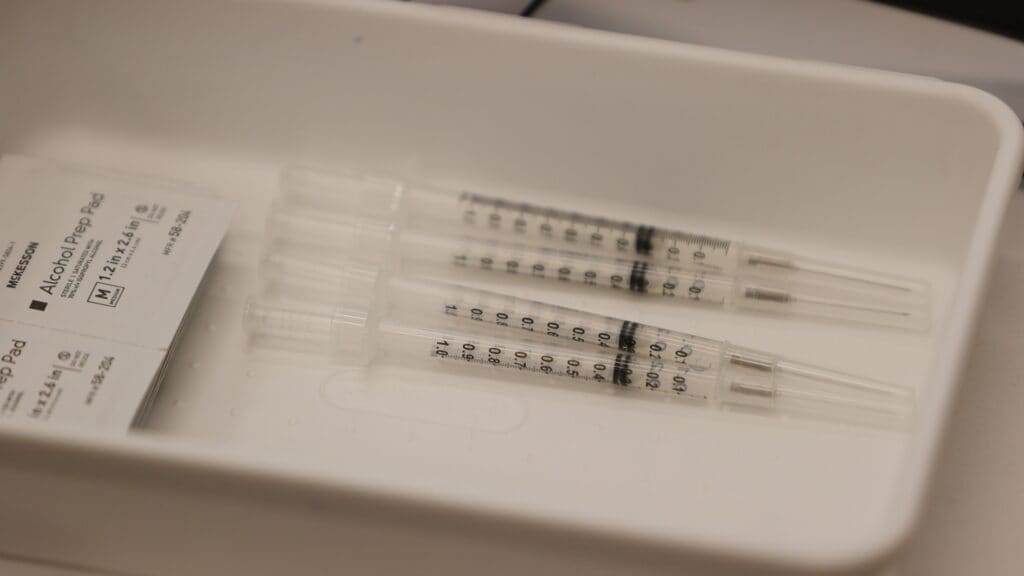U.S. regulators on Monday expanded the use of Pfizer’s COVID-19 vaccine to children as young as 12, offering a way to protect the nation’s adolescents before they head back to school in the fall and paving the way for them to return to more normal activities.
Shots could begin as soon as Thursday, after a federal vaccine advisory committee issues recommendations for using the two-dose vaccine in 12- to 15-year-olds. An announcement is expected Wednesday.
Most COVID-19 vaccines worldwide have been authorized for adults. Pfizer’s vaccine is being used in multiple countries for teens as young as 16, and Canada recently became the first to expand use to 12 and up. Parents, school administrators and public health officials elsewhere have eagerly awaited approval for the shot to be made available to more kids.
“This is a watershed moment in our ability to fight back the COVID-19 pandemic,” Dr. Bill Gruber, a Pfizer senior vice president who’s also a pediatrician, told The Associated Press.
Read More: Publix pharmacies offer walk-in COVID vaccines in 7 states

The Food and Drug Administration declared that the Pfizer vaccine is safe and offers strong protection for younger teens based on testing of more than 2,000 U.S. volunteers ages 12 to 15. The agency noted there were no cases of COVID-19 among fully vaccinated adolescents compared with 16 among kids given dummy shots. More intriguing, researchers found the kids developed higher levels of virus-fighting antibodies than earlier studies measured in young adults.
The younger teens received the same vaccine dosage as adults and had the same side effects, mostly sore arms and flu-like fever, chills or aches that signal a revved-up immune system, especially after the second dose.
Pfizer’s testing in adolescents “met our rigorous standards,” FDA vaccine chief Dr. Peter Marks said. “Having a vaccine authorized for a younger population is a critical step in continuing to lessen the immense public health burden caused by the COVID-19 pandemic.”
Pfizer and its German partner BioNTech recently requested similar authorization in the European Union, with other countries to follow.
The latest news is welcome for U.S. families struggling to decide what activities are safe to resume when the youngest family members remain unvaccinated.
“I can’t feel totally comfortable because my boys aren’t vaccinated,” said Carrie Vittitoe, a substitute teacher and freelance writer in Louisville, Kentucky, who is fully vaccinated, as are her husband and 17-year-old daughter.

The FDA decision means her 13-year-old son soon could be eligible, leaving only her 11-year-old son unvaccinated. The family has not yet resumed going to church, and summer vacation will be a road trip so they do not have to get on a plane.
“We can’t really go back to normal because two-fifths of our family don’t have protection,” Vittitoe said.
President Joe Biden said Monday’s decision marked another important step in the nation’s march back to regular life.
“The light at the end of the tunnel is growing, and today it got a little brighter,” Biden said in a statement.
Pfizer is not the only company seeking to lower the age limit for its vaccine. Moderna recently said preliminary results from its study in 12- to 17-year-olds show strong protection and no serious side effects. Another U.S. company, Novavax, has a COVID-19 vaccine in late-stage development and just began a study in 12- to 17-year-olds.
Next up is testing whether the vaccine works for even younger children. Both Pfizer and Moderna have begun U.S. studies in children ages 6 months to 11 years. Those studies explore whether babies, preschoolers and elementary-age kids will need different doses than teens and adults. Gruber said Pfizer expects its first results in the fall.
Outside of the U.S., AstraZeneca is studying its vaccine among 6- to 17-year-olds in Britain. And in China, Sinovac recently announced that it has submitted preliminary data to Chinese regulators showing its vaccine is safe in children as young as 3.

Read More: Vaccine deserts: Some countries have no COVID-19 jabs at all
Children are far less likely than adults to get seriously ill from COVID-19, yet they represent nearly 14% of the nation’s coronavirus cases. At least 296 have died from COVID-19 in the U.S. alone, and more than 15,000 have been hospitalized, according to a tally by the American Academy of Pediatrics.< /p>
That’s not counting the toll of family members becoming ill or dying — or the disruption to school, sports and other activities so crucial to children’s overall well-being.
The AAP welcomed the FDA’s decision.
“Our youngest generations have shouldered heavy burdens over the past year, and the vaccine is a hopeful sign that they will be able to begin to experience all the activities that are so important for their health and development,” said AAP President Dr. Lee Savio Beers in a statement.
Experts say children must get the shots if the country is to vaccinate the 70% to 85% of the population necessary to reach what’s called herd immunity.
In the meantime, the Centers for Disease Control and Prevention says unvaccinated people — including children — should continue taking precautions such as wearing masks indoors and keeping their distance from other unvaccinated people outside of their households.
Have you subscribed to theGrio’s new podcast “Dear Culture”? Download our newest episodes now!
TheGrio is now on Apple TV, Amazon Fire, and Roku. Download theGrio today!
Share
